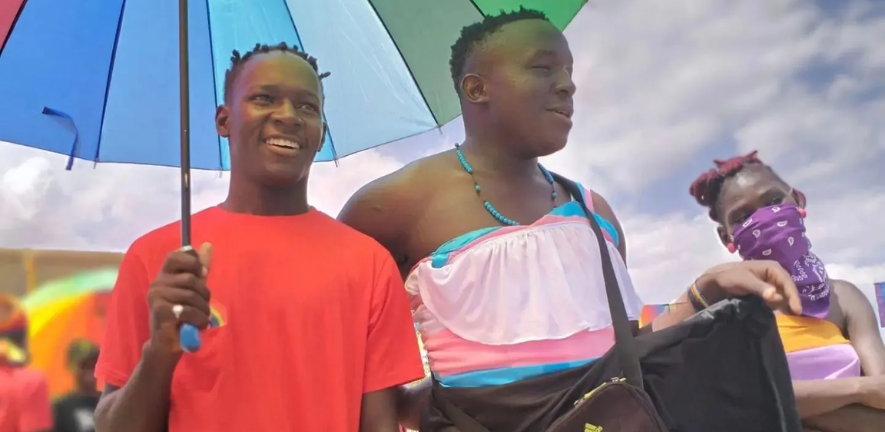
Image reproduced by kind permission: https://www.freeblock13.com
Ilaria Michelis is a PhD candidate in Sociology and a Gates Scholar at Cambridge. She has worked in the humanitarian sector for over 15 years, focusing on gender-based violence, gender equality and LGBTQI+ inclusion, primarily in East and Central Africa, the Middle East and Europe.
Her research focuses on intersectionality in humanitarian and feminist organisations supporting refugee, asylum-seeking and migrant women who have experienced violence.
Part of this blog is taken from her article Later Is a Cis-Hetero Patriarchal Time Zone: Narratives of Resistance to LGBTQI+ Inclusion amongst Humanitarian Practitioners published in the Journal of Refugee Studies in 2023.
The first time I took part in a conversation about LGBT inclusion (QI+ were far off into the future) in humanitarian response I spent the evening crying in my hotel room. With the gift of hindsight, I appreciate the efforts of my colleagues who had the courage to organise such a discussion in the midst of public debates on introducing the death penalty for the crime of homosexuality in 2010 Uganda. However, that discussion did not go well and I found myself confronting a wall of homophobic insults from colleagues I shared a meal with every day, having (secretly of course) just entered my first same-gender relationship. David Kato, a Ugandan gay activist, had been killed a few weeks earlier.
From that very first experience and for the rest of the fifteen years I have spent working in the humanitarian sector, I have remained deeply aware of the very real risks that LGBTQI+ forcibly displaced people face and of the dangers of well-meaning but poorly executed efforts towards inclusion. When people say they are trying to ‘do no harm’, I thank them for not jumping on the bandwagon of LGBTQI+ inclusion to get funds they would scarcely know how to use in meaningful and, critically, safe ways.
Yet, I sometimes struggle to believe that so little has changed since I was a 20-something navigating her coming out in Uganda. For sure, most UN agencies and international NGOs now openly celebrate Pride month on their social media and their websites have statements of commitment to supporting LGBTQI+ rights. Reports on the protection risks faced by forcibly displaced LGBTQI+ people [1] and training materials have been published. Edge Effect, an organisation entirely dedicated to advocating and supporting LGBTQI+ inclusion in the humanitarian sector, was founded in 2017 and in 2023 Outright International, a global LGBTQI+ rights advocacy organisation, appointed their first Director of Humanitarian and Global Development Programs. These are truly encouraging signs, but in reality the specific vulnerabilities and demands of LGBTQI+ forcibly displaced persons remain vastly unaddressed.
Studies show that during the COVID-19 pandemic, for example, the re-orientation of humanitarian funding and approaches towards public health rarely included deliberate consideration of how LGBTQI+ populations would be affected [2]. Ugandan LGBTQI+ refugees living in the Kakuma refugee camp in Kenya have been waging a campaign to raise awareness about the extreme levels of violence they are facing and demand effective protection from the humanitarian actors who have so far failed them. What is preventing the translation of humanitarian agency’s high-level commitments into concrete funding and programmes to support forcibly displaced LGBTQI+ people?
The answer is to be partly found in how humanitarian practitioners, or aid workers, think and talk about LGBTQI+ inclusion. I spent fifteen years hearing a range of justifications as to why it was ‘not yet’ time for LGBTQI+ people to be acknowledged and treated fairly by the humanitarian system. In my latest article, which draws from interviews I conducted with humanitarian practitioners in 2019, I summarise these justifications into five narratives:
1. There is nothing we can do: law and culture
2. Training first
3. Data first
4. (Cisgender) Women first
5. Partners first
While each narrative uses different tactics, the key message across all of them is the same: we cannot yet include LGBTQI+ people in humanitarian responses because we need to do something else first. We need to change laws, change the local culture, train all our current and future staff, collect quantitative data to prove LGBTQI+ people even exist, reach gender equality between cisgender men and women (good luck with that one!), identify, train and fund a whole range of local organisations so that they can take the risks we are not willing to assume ourselves. Don’t worry, their turn will come, at some point, but not yet.
However, the humanitarian system operates, by definition, in the now of the emergency, the urgent response, the immediate needs. Even in protracted crises that have kept humanitarian actors on the ground for decades, they function in a constant sense of urgency, with high levels of staff turnover, ever-pressing deadlines, and short funding cycles. In the humanitarian system, later never really comes and, if it does, it is often someone else’s responsibility.
So while I truly appreciate everyone’s commitment to doing no harm as they consider how to finally acknowledge and support LGBTQI+ people in humanitarian crises, I would also like them to recognise that business as usual is already doing harm. LGBTQI+ forcibly displaced people, and in particular LBTQI+ women and non-binary folks, are currently being abused, exploited, and stigmatised within a humanitarian system which ignores their specific vulnerabilities and signals their irrelevance to the broader community. Doing training after training on LGBTQI+ inclusion within a UN compound is not the same as creating appropriate shelters for gender non-conforming refugees, collecting data and doing research is not the same as ensuring trans sex workers can access healthcare after experiencing gender-based violence. All of these are important actions to ensure a safe and high quality response, but they cannot replace or infinitely delay the moment when forcibly displaced LGBTQI+ people will actually be considered deserving subjects of humanitarian assistance. ‘Later’ is no longer an acceptable answer.
[1] See https://www.sddirect.org.uk/sites/default/files/2023-07/WhatWorks-FlagshipReport%20online.pdf and https://www.rescue.org/sites/default/files/document/5961/irccyclesofdisplacementfinaljune2021.pdf
[2] See https://outrightinternational.org/sites/default/files/2023-04/COVIDReportMay_Revised_OutrightInternational_V2_3.pdf; DOI: 10.1080/19392206.2021.2006402; https://www.researchgate.net/publication/347621139_A_Queer_Approach_to_Understanding_LGBT_Vulnerability_during_the_COVID-19_Pandemic




